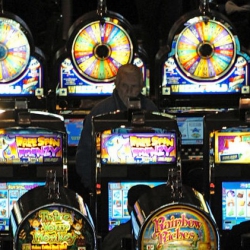Officials from the Mohegan and Mashantucket Pequot tribes who spoke at a Connecticut House of Representatives hearing on Thursday said the state does not need a new gambling study. The officials had been called to give their opinions on State Rep. Chris Perone’s proposal to launched a statewide study of the Connecticut gambling industry. Perone’s study would explore whether other potential sites besides the Hartford area might be better for the state’s gaming revenues.
Rodney Butler, who serves as the chairman of the Mashantucket Pequot (Foxwoods) Tribal Council, said the question has already been studied. Butler said the two tribes had a study last year that showed the Hartford area was the best place to put a third Connecticut casino.
Rodney Butler on a New Gaming Study
Butler told the house committee, “We already know the answer. We know that we are going to lose thousands of jobs, hundreds of millions [of dollars] in revenue out of the state of Connecticut that are going to go over the border to Springfield. We don’t need any further analysis to tell us that. We already know that.”
Mr. Butler told the lawmakers on the committee that the state faces a dramatic loss of gaming revenues if leaders do not take immediate measures to keep gamblers in the state. He pointed to the loss of gamblers from the New York City and Providence areas as a key reason Foxwoods Casino and Mohegan Sun have struggled to maintain their revenues in the past few years.
The Foxwoods representative said, “Our failure to square off against competition in Rhode Islsnd and New York led to a 30-percent reduction in slot revenue.”
The Rise and Fall of Tribal Casinos
Foxwoods and Mohegan Sun had been bitter rivals since Mohegan Sun opened in 1996. Foxwoods began operations as a bingo hall in 1986, but it expanded operations in 1992. Both became world class casino resorts in the late-1990s and first decade of the 2000s, drawing customers from New York State and the New England region. Increased competition and bad investments have left the two casinos badly in debt.
In the early 2000s, nearby states began to build rival casinos. Pennsylvania became the 2nd-largest gaming economy in the United States through allowing racetrack casinos and a few private casinos, while New York built tribal casinos and racetrack casinos with video lottery terminals (VLTs). Meanwhile, Rhode Island approved smaller casinos.
Crushing Debt for Foxwoods and Mohegan Sun
These days, it is estimated Foxwoods Casino is $2.3 billion in debt, while Mohegan Sun is $1.6 billion in debt. Thus, when the State of Massachusetts approved a casino license for the city of Springfield in Western Massachusetts, it was seen by the tribes as a dagger pointed at the heart of both tribal gaming entities. They argued to Connecticut lawmakers that the MGM Springfield would be a disaster to the tribes and to the state’s gaming revenues, unless a satellite casino were built in the Hartford area.
The satellite casino would act as a “firewall” against Hartford area gamblers leaving the state to gamble in Sprinfield, only 30 miles away. Though a smaller slots-in-a-box casino, the new casino likely would draw nearby gamblers, who wouldn’t have to make an hour round-trip journey to gamble. Nothing can be done to lure Massachusetts area gamblers, but the firewall on the I-91 Corridor would mitigate the economic disaster to a certain degree.
Schaghticoke Tribe Lawsuit
Meanwhile, the Schaghticoke Tribal Nation (of Connecticut) and MGM Resorts have accused Connecticut lawmakers of protecting their local duopoly by greenlighting the Hartfard-area casino without a proper licensing process. MGM Resorts claimed they wanted to build a casino in Bridgeport, while the Schaghticoke Tribal Nation wants a casino on their tribal grounds. They claim it is unfair to give a casino to the Mohegan and Mashantucket Pequot tribes, who already have their gaming ventures (however failed they might be).
During Thursday’s hearing, the chief of Schaghticoke Tribal Nation, Richard Velky, told lawmakers that his tribe “ready and willing and able to participate” in a licensing process. It is known that the Schaghticoke Tribe’s lawsuit against the state is being bankrolled by MGM Resorts.
Chris Perone’s Study
Rep. Chris Perone called the meeting after MGM Resorts released a report last week which said southeastern Connecticut, near New York City, would be the best place to build a third casino in the state. MGM Resorts’s study implied the Hartford casino represents a shortsided attempt by legislators to protect its two longstanding gaming interests, at the expense of taxpayers. Tribal casinos pay 25% of slot machine revenues to the state, as part of a tribal gaming compact.
The MGM Resorts report suggests more revenues would be drawn from the southwestern part of the state, because it would lure a certain number of gamblers from the 10 million-plus population of New York City.
2015 Gaming Study
Rodney Butler disagrees. He cited the Foxwoods and Mohegan tribes’ report that Hartford area would be more lucrative, saying MGM Resorts cooked the books, because they wanted a casino further away from their upcoming resort in Springfield.
Thus, both sides accuse the other of pursuing their selfish interests. Outside observers are likely to conclude that both are right, at least when they criticize their opponents.

